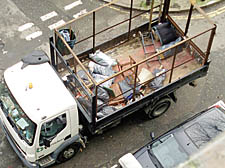|
|
 |
| |

The van which took away Mrs Robinson’s possessions
|
Woman’s flat emptied as she lies sick in hospital
Council clears out 92-year-old’s possessions assuming she is dead
THE possessions of a sick 92-year-old were cleared from her flat and dumped by council officials who told her neighbours she was dead – in a case highlighting a loophole in council procedure investigated by the New Journal.
Officials from the Housing Management department entered the Highgate flat of Mrs Dorothy Robinson, 92, while she was in a nursing home on January 4.
They spent two-and-a-half days removing furniture from the flat in Lissenden Gardens and ‘disposing of it’ – to a skip, as a spokeswoman later confirmed.
When a neighbour asked what they were doing, officials told him Mrs Robinson was dead- a mistake that a press official said this week was a “misunderstanding and we apologise for any distress caused”.
Mrs Robinson had in fact been in a nursing home in Claremont Road, Cricklewood, for more than 18 months when council officers changed the locks a few days before the clearance began.
In Camden the possessions of tenants who are legally considered to have surrendered their tenancies through death, sickness or absence and who list no next of kin are put into skips so that new tenants can be moved in as quickly as possible.
When asked, Camden Council was unable to say what safeguards exist to prevent theft or fraud during the clearance process, or what measures were taken to try to trace a next of kin who might inherit the goods.
Mrs Robinson passed away two weeks after the clearance.
A council press official said: “Due to Mrs Robinson not having any known next of kin, social services acted on her behalf, and as her representative surrendered the tenancy on her behalf. Camden Council then have a legal right to clear the property as a condition of the tenancy.”
The same official said next of kin were contacted in such circumstances if “we have a record of a next of kin which is provided to us by the tenant when they become a council tenant. In this case social services did contact a person who was a friend of Ms Robinson and asked them if they knew of anyone who could assist with the decision about the disposal of the goods. They didn’t know of anyone.”
When asked whether any record was kept of the goods removed from properties under these circumstances, or any attempt made to restore valuable items to their owners, the official said:
“We have no means of disposing of the goods commercially and there is no practical means of having one given the time constraints in turn around before a new tenant moves into the property. We therefore cannot recover any money for them thus the goods have no value.”
The story might not have come to light if it had not been for two neighbours of Mrs Robinson, Hillary Katz and Harry Greenberg.
The two, who lived in the same mansion block, had stored some of their furniture in Mrs Robinson’s flat while she was in care.
Mr Katz saw his own possessions being removed in the van by officials who refused to give them back to him.
Of an estimated dozen items he stored in the flat, two were eventually returned to him, he said yesterday.
He said: “The question that I want answered is: what sort of inventory is taken of that stuff? What happens if they find a ring worth £5,000? Where does it go?”
|
 |
|
 |
|